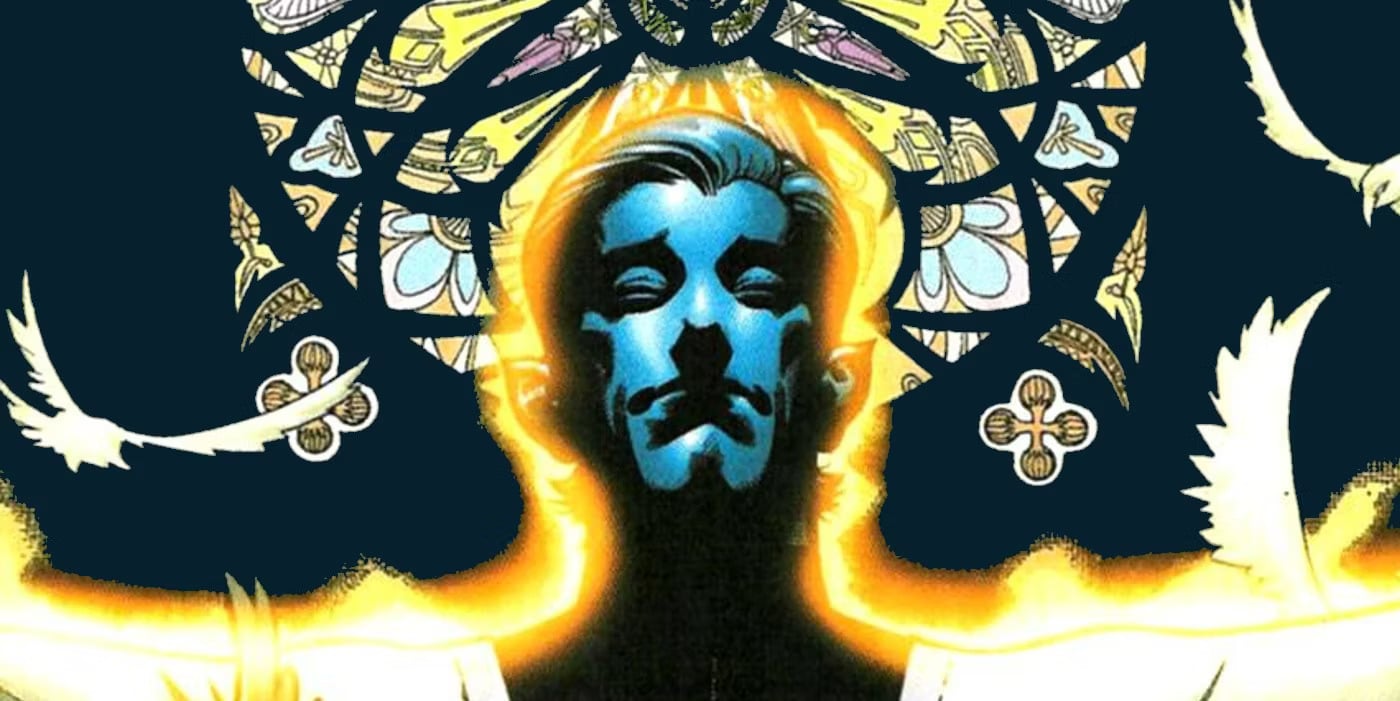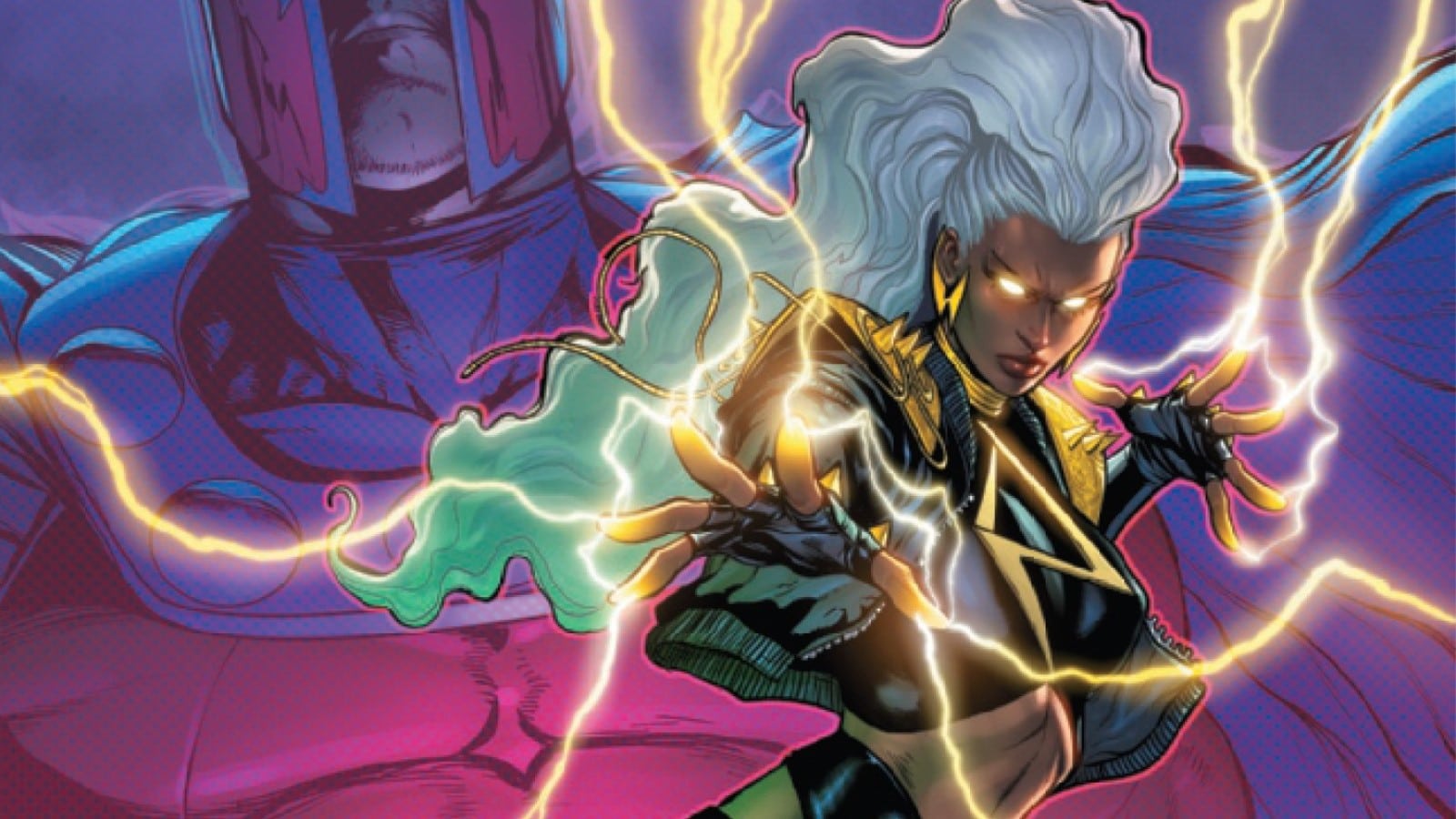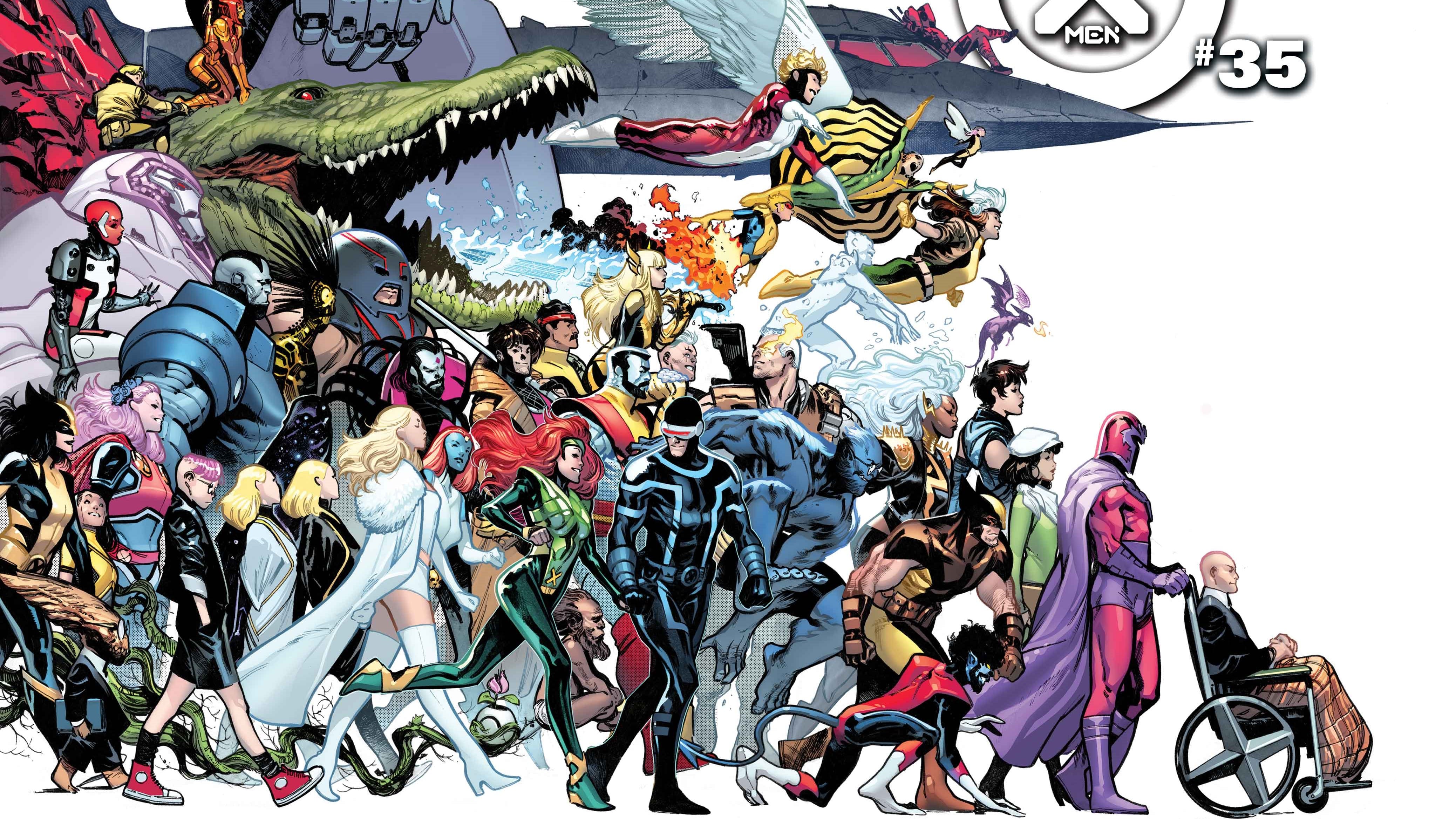
In Daredevil Vol. 8 #6, aka Daredevil #668, Matt Murdock, with the assistance of Doctor Strange, summons a gateway to Hell in part by quoting the book of Proverbs. Proverbs (or מִשְלֵי) is a book found within the Jewish and Christian scriptural canons. It is a collection of short sayings meant to impart wisdom; here, Murdock quotes Proverbs 28: 13, a verse which urges the reader to fess up to whatever wrongs they have committed. It hearkens to the opening of the issue, in which he undertakes the Catholic sacrament of confession.
This volume of Daredevil has often turned to scripture in dialogue. Typically, pop-fiction — be it superhero comics, blockbusters, or the TV shows your mom watches — does a fairly bad job of incorporating religion generally and religious scriptures in particular. Quotation tends to be clunky at best, rarely representing how people might actually talk about and quote from a book they find meaningful. Instead, a few famous quotations are dropped in merely to signify that this is a Religious Character. This Religious Character is so religious that they can quote a book. It’s closer to nerds on The Big Bang Theory awkwardly referencing Batman RIP, when actual conversations tend to sound like real nerds do when chatting about the Morrison run. Of course, some people do actually talk like that — but it’s mostly a small subset of evangelical Christians, and then mostly when they’re giving speeches or preaching on TV.
Daredevil Vol. 8 has, for the most part, done a far better job of things. The characters tend to quote scripture a bit more often than real Catholic priests would (who are just as likely, if they’re dropping quotes, to turn to Augustine, Aquinas, their favorite 20th century weirdo theologian, Hopkins, etc), but they tend to do so when scripture is actually relevant to particulars of their conversation, and they tend to cite passages that deepen that conversation. If you read each issue without much thought, the conversations ring true, and if you do choose to think about the choices made in dialogue, the passages cited tend to reflect the thematic or narrative concerns of the issue. This is not to say that Daredevil is particularly religiously deep — it’s still a comic about a superhero performing exorcisms by beating up other superheroes — but it is to say that Daredevil is thoughtful.
The same is true of the other religious elements incorporated into the narrative thus far. When Murdock recites the act of contrition rather than the rite of exorcism, this feels like a choice rather than a mistake, like the story is trying to connect one’s ability to cast out the demons that have followed you with one’s ability to acknowledge the harm you have done to the world (a connection that shifts from subtext to text in this issue). Murdock’s relationship with the sacraments, with the church hierarchy, and with scripture all at times differ from what you might expect of a Catholic priest in reality, but almost all of these differences feel like meaningful choices in the narrative.
Which is why it’s so maddening that he keeps quoting the King James Bible.
I. What the KJV is and why it matters
King James VI/I of Scotland/ England commissioned a new translation of Hebrew and Christian scriptures into English in the early 1600s. To this day, the King James Version of the Bible remains the single most common translation of those books in English. It is often a beautiful translation; it is more often a grossly inaccurate one, and it is more often still an inaccessible one, thanks to linguistic drift over the past four centuries. Turn back the clock a hundred years, or even a few decades, and you’ll find that most literate English-speakers would be broadly familiar with the book, even if they hadn’t actually sat down and read it.
Because it’s so popular, it ends up being used as the default translation in most works of pop-fiction, from Midnight Mass to Daredevil, regardless of whether its use makes much sense in any particular story. In these notes, I’ve picked three recent examples from Marvel Comics of stories incorporating language from the KJV, to illustrate how it might be used poorly, used well, and used messily.
II. Why it’s weird in Daredevil
This is not to say that all English-speakers a few decades ago would choose, when quoting scripture, to turn to the KJV. King James was a Protestant, and the KJV is used by Protestant denominations. You will not find it in a Catholic church. You will not be able to purchase it in a Catholic bookstore.
The King James Version of the Bible is not a Catholic Bible.
This may not seem important — who cares that much if some words here and there are slightly different from one translation to the next, if, by nature of being translations, they’re all a bit off from the original anyway — but the split between Protestantism and Catholicism was in part defined by matters of translation and by the texts each camp published. Protestantism was fond of translation in the common tongue, whereas Catholicism preferred translation into Latin. Even when the Catholic church gave ground on this matter, the actual texts differed in very explicit ways: Verses and entire books which the Catholic church considered canonical were considered apocryphal by Protestants, and relegated to a secondary place (until it became common to drop them entirely from publication). Further, translators are not neutral; when translating difficult and ambiguous texts on religious matters, whether one believes in, for example, predestination, may matter to the choices the translator makes.
So when a fictional character who is a Catholic priest quotes a lot of scripture in conversation, it may sound a little off — but when he quotes from the KJV, the conversation is now entirely removed from reality.
Of course, this won’t matter to the vast, vast majority of readers. Extremely few people will ever notice this — even most Catholics, since, again, most Catholics don’t bother reading much scripture. Something will sound a bit off, but they won’t recognize what, and they’ll move on. But to those unfortunate few of us who happen to know, it tosses you out of the fiction. It’s our “brain scientist says that people only use 10% of your brain.” No, a character talking in this way is not nearly as significant a break from our reality as a character gaining superpowers from a radioactive spill. And yet, in that moment, when we see that line of dialogue, we will stop, be removed from the immersion of the fiction, and go, “Ah. Well. That kind of person of course wouldn’t say that.”
So. What texts would Catholics quote? Catholics do pick up lines from the KJV here and there, as any English-speakers do, but outside of the most famous passages, they will, again, not know that text. As Catholics stereotypically do not read much scripture; their most likely exposure to scripture is at Mass on Sundays, where Americans now hear readings based on the New American Bible, and English speakers elsewhere hear readings from the Jerusalem Bible, a Catholic edition of the New Revised Standard Version, or a Catholic edition of the English Standard Version. If they own a Bible, it will likely be an NRSVCE or NAB. A few might have the Jerusalem Bible, the Knox Bible, or — very helpful for our purposes — the Douay-Rheims. The DRV was the Catholic Church’s response to the KJV. It, like the KJV, is a pretty bad translation, and it, like the KJV, often uses languages no longer completely accessible to the average reader — but it also sounds cool and old like the KJV. It would be an entirely acceptable alternative to the KJV in most contexts.
Earlier in #8, Murdock quotes the New American Bible’s translation of James 2:13: “Mercy triumphs over judgment” (or, well, he quotes from what may be the NAB; a dozen translations arrive at the same end result). I think this shows that there is thought going into the use of different translations in this series; a more conversational translation is used in conversation, and a more traditional translation for a ritual. It may be silly for me to care about this, but Saladin Ahmed and Marvel’s editorial staff also seem to care about this stuff, at least to a degree — and so I would urge them (and anyone writing fiction with Christian characters) to think about the role of denomination when it comes to choosing the right quotation.
(And cracking open a Catholic bible will give you more options too, with some pretty wild stuff. There’s an extra story about a dragon in there. There’s a story where an angel helps a guy get laid. And so on.)
III. Why it’s not weird in Immortal Thor
“This character would not know the King James Bible” doesn’t always make a character quoting/ alluding to that translation a weird thing. Recently, Immortal Thor #8 uses language hearkening back to the KJV of Job (as Immortal Hulk did before it), but also passages of the Christian gospels.

I’m tossed out of the fiction when a Catholic priest quotes from the KJV, but not when an amalgamation of various pagan conceptions of Earth-goddess riffs on it? Why is that?
Part of it comes down to the simple fact that, in genre fiction, it’s always easier to swallow anything involving the fantastical elements than it is anything resembling our reality. But I think it’s also the specific approach to the text that makes it feel more reasonable here. The language of the KJV is used in Daredevil to show something about the character’s interior life, and the substance of that text is most important. Here, KJV-ish language is used to show something about how we should feel about this character and this dialogue, and its connotation is most important.
Second of all, the contrast is foregrounded. In Daredevil, a Catholic priest quoting the KJV would be a lot more sensible if, somehow, the oddness of that circumstance was directly addressed in the text. If Murdock quoting an unusual translation for a priest matters to our understanding of the character, it’s no longer immersion-breaking. Here, the language of the KJV is used in a dialogue about gnostic cosmology and marvel continuity. The story clearly doesn’t think that KJV actually belongs in Gaea’s hands, and so it doesn’t appear like a mistake that the creators behind it made.
Third of all, the shift from quotation to paraphrase or remixing aids both points one and two. By reworking the passages instead of directly quoting them, it’s easier to read as merely evoking the feeling of the original text, and it’s easier to fit into this different context.
IV. Why it’s kind of weird in X-Men: From the Ashes

I’m going to be honest: I don’t know that much about Jubilation Lee. I didn’t watch the cartoon when I was a kid, and I never lived near a comic book store. I’ve read nearly every X-Men comic from 2011 to the present day, a lot of X-Men comics from 2001-11, and nearly every X-Men comic from 1975-91, but the ’90s themselves are mostly a mystery to me. It’s entirely possible that Jubilee might make the list of X-Men who, in my mind, should quote substantially from scripture (Nightcrawler, Exodus, Oya, Magneto, Beast, Professor X, Wolfsbane), and maybe even the list of characters who should quote substantially from the KJV (Beast, Prof X, Wolfsbane), and maybe even the list of characters who should quote substantially from the KJV for reasons other than extreme pretension (Wolfsbane). I doubt it, but it’s very possible.
Still, even if she doesn’t make any of those lists, the quotation in question isn’t that weird, because it’s a very famous passage. Sometimes a line from the KJV is reasonable because the character in question would know the text; other times the line is reasonable because it’s the only way to properly convey a certain tone; and then sometimes a line is reasonable simply because it has wormed its way into everyday English, thanks to it originating in the book that altered the course of that language more so than any other individual text, and 1 Corithians especially is very, very common. It’s not weird for a non-religious character to say that “love is patient, love is kind,” and “when I became a man, I put away childish things” is almost at that level of fame.
So why does it rub me the wrong way? And it’s not just me — in my conversations about this issue, the page in question worked for plenty of people, and just felt off to others.
I think there’s a few very small choices that contribute to this feeling, where it feels just a bit too religious, or just a bit off, even though it should just land as a common quotation.
First of all, it’s not just one line said in one moment of dialogue. The quotation stretches across the page. This extension makes it feel a bit less like a character thinking about a famous quote, and more like a character contemplating a passage of scripture. The connotations of the former are less religious than the latter.
Second of all, to fit that page, it includes a bit more than the most famous part of the quotation, and that extra bit just sounds a lot older (“I put away childish things” uses grammar and vocabulary that are completely compatible with contemporary English, but “I spake as a child” is antiquated). More antiquated language shifts the connotation away from “person quoting a common saying” and toward “preacher-talk.”
Third of all, religious knowledge among the general public — including among those who identify as religious — is continually dwindling. As we move away from a society where the average person might be able to confidently quote from Proverbs at length, it becomes particularly odd when a younger person is able to do so; Xavier quoting the KJV feels less like an indication of his religious practices than the same quotation given to a member of a younger generation. Jubilee isn’t as young as she once was (and, strikingly, that’s the point of this issue), but no longer narratively a mom, she’s back to feeling nebulously early 20s.
Again, as in Daredevil, these problems don’t seem to be the result of thoughtlessness; the passage is carefully chosen for its relevance to the issue, for the state of mind of the character, and for its ability to pace the reader down the page. It’s a well-constructed page of comics. And unlike the quotation in Daredevil, I’m not sure, if I were an editor rather than an armchair editor, that I’d ask for it to be replaced. Shortening the quotation solves the problems above, but it wrecks the pacing. A more modern translation might help (the simple change in the New KJV from “spake” to “spoke” goes a long way in my mind), or a simple paraphrase, rewording the passage in the character’s own voice (which also gets rid of the oddity of “man” in the quotation, confusing to the readers who don’t recognize it).
Ultimately, though, whether this page works comes down less to individual knowledge, as in Daredevil, and more to individual taste. It didn’t quite work for me; it worked for others. I’m including it here not because it was an error, but because I think it’s useful to see an application of the KJV that falls somewhere between the failure of Daredevil and the success of Immortal Thor. It shows that there aren’t always universal rules to apply to this stuff.
V. A free list of rules to apply to this stuff
- Only use quotations from the King James Bible if your characters are Protestant and trying to sound traditional, if your characters are stuffy intellectuals trying to sound snobbish, if you are trying to evoke religious awe, or if you are quoting an extremely commonly quoted passage, something that has worked its way into most English speakers’ lexicons.
- If you are trying to evoke a similar kind of religious awe or sense of tradition for Catholic characters, use the DRV instead of the KJV.
- If your characters are engaging in ordinary dialogue, and if you want to use a text that they might more likely read and use in their-day-to-day lives, the NRSV or NRSV Catholic Edition is a safe bet.
- You can also just google “what translation does [sect of character] tend to use in their services?”
- Amount of text and amount of time spent with the text both alter the effect on the reader.
- Evangelical Protestants typically just stick to scripture, but other religions who engage with Hebrew and/or Christian scriptures tend to often quote texts in conversation alongside or in place of scripture, and the specific kinds of texts differ from religion to religion, sect to sect.
Robert Secundus is an amateur-angelologist-for-hire.






